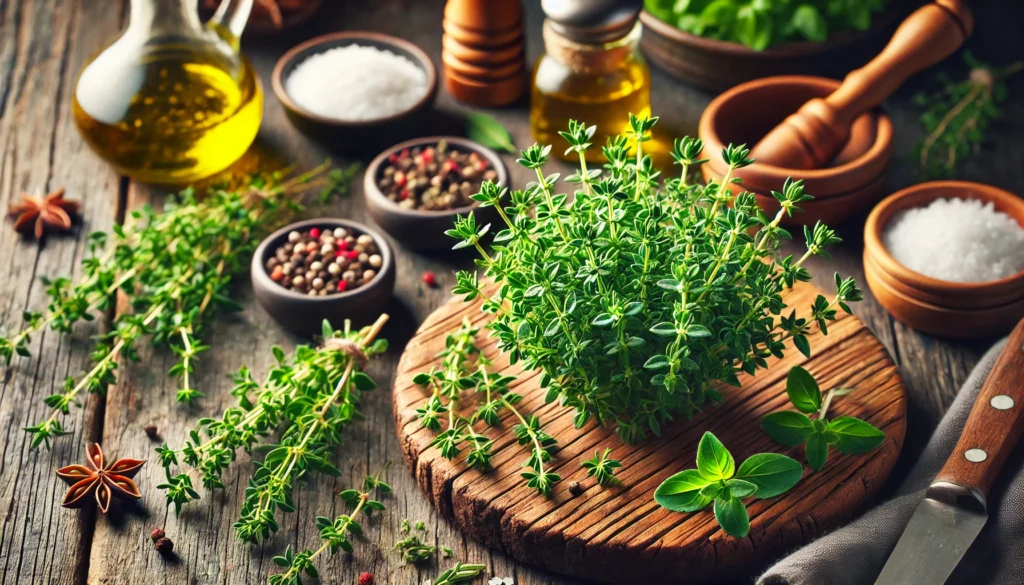Thyme Herb: Tips, Recipes, and Health Benefits
How to use thyme herb?
Thyme herb, a small but powerful herb, has been a staple in culinary and medicinal practices for centuries. This aromatic herb not only enhances the flavor of dishes but also offers numerous health benefits.
Nutritional Profile
Thyme is rich in vitamins A and C, as well as copper, fiber, iron, and manganese. These nutrients contribute to its various health benefits.
Top Health Benefits of Thyme
- Boosts Immunity: Thyme is packed with vitamin C, which is essential for a strong immune system. It also has antimicrobial properties that help fight off infections.
- Improves Respiratory Health: Thyme can help relieve coughs and bronchitis. Its essential oils are effective in reducing inflammation and mucus buildup.
- Promotes Digestive Health: Thyme aids in digestion by stimulating the production of digestive enzymes. It can help alleviate symptoms of indigestion and bloating.
- Antioxidant Properties: Thyme contains high levels of antioxidants, which protect the body from damage caused by free radicals.
- Anti-inflammatory Effects: The compounds in thyme, such as thymol, have anti-inflammatory properties that can help reduce inflammation in the body.
Incorporating thyme into your diet can offer significant health benefits. Whether you use it in cooking or as an herbal remedy, thyme is a versatile and beneficial herb to have in your kitchen.

How to Use the Herb Thyme: Tips and Recipes
Thyme, a versatile herb with a distinctive flavor, has been a staple in culinary and medicinal practices for centuries. Its aromatic qualities and health benefits make it a valuable addition to any kitchen. Here’s a guide on how to use thyme in various ways to enhance your dishes and well-being.
Culinary Uses of Thyme
Fresh Thyme: Fresh thyme has a delicate flavor and is best added towards the end of cooking to preserve its aroma. It can be used whole or with the leaves stripped from the stem.
Dried Thyme: Dried thyme has a more concentrated flavor and is ideal for slow-cooked dishes. It can be added at the beginning of the cooking process to allow the flavors to develop.
Flavoring Soups and Stews
Thyme is a classic ingredient in soups and stews, adding depth and complexity. Add a few sprigs of fresh thyme or a teaspoon of dried thyme to your favorite soup or stew recipe for enhanced flavor.
Seasoning Roasts and Vegetables
Thyme pairs exceptionally well with roasted meats and vegetables. Create a simple herb rub by mixing thyme with olive oil, garlic, salt, and pepper, and apply it to meats like chicken, beef, or lamb before roasting.
Sprinkle fresh or dried thyme over vegetables like potatoes, carrots, and bell peppers before roasting them in the oven for a flavorful side dish.
Infusing Oils and Vinegars
Infused oils and vinegars are a great way to incorporate thyme into your cooking. Place fresh thyme sprigs in a bottle of olive oil or vinegar and let it sit for a few weeks. Use the infused oil or vinegar in salad dressings, marinades, or as a finishing touch to dishes.
Making Herbal Teas
Thyme tea is a soothing and healthful beverage. Steep a few fresh thyme sprigs or a teaspoon of dried thyme in hot water for 5-10 minutes. Add honey or lemon to taste for a comforting drink that supports respiratory health and digestion.
Enhancing Sauces and Gravies
Thyme adds a rich flavor to sauces and gravies. Include thyme in your recipes for tomato sauce, gravy, or pan sauces to elevate the taste.
Medicinal Uses of Thyme
Natural Cough Remedy. Thyme is known for its respiratory benefits. Make a homemade cough syrup by steeping fresh thyme in hot water and adding honey. This can help soothe a sore throat and reduce coughing.
Digestive Aid: Thyme can aid in digestion and relieve symptoms of indigestion and bloating. Add thyme to your meals or drink thyme tea after eating to support digestive health.
Skin Care: Thyme can aid in digestion and relieve symptoms of indigestion and bloating. Add thyme to your meals or drink thyme tea after eating to support digestive health.
Stress Relief: The calming aroma of thyme can help reduce stress and anxiety. Add a few drops of thyme essential oil to a diffuser or bath for a relaxing experience.

Leave a Reply